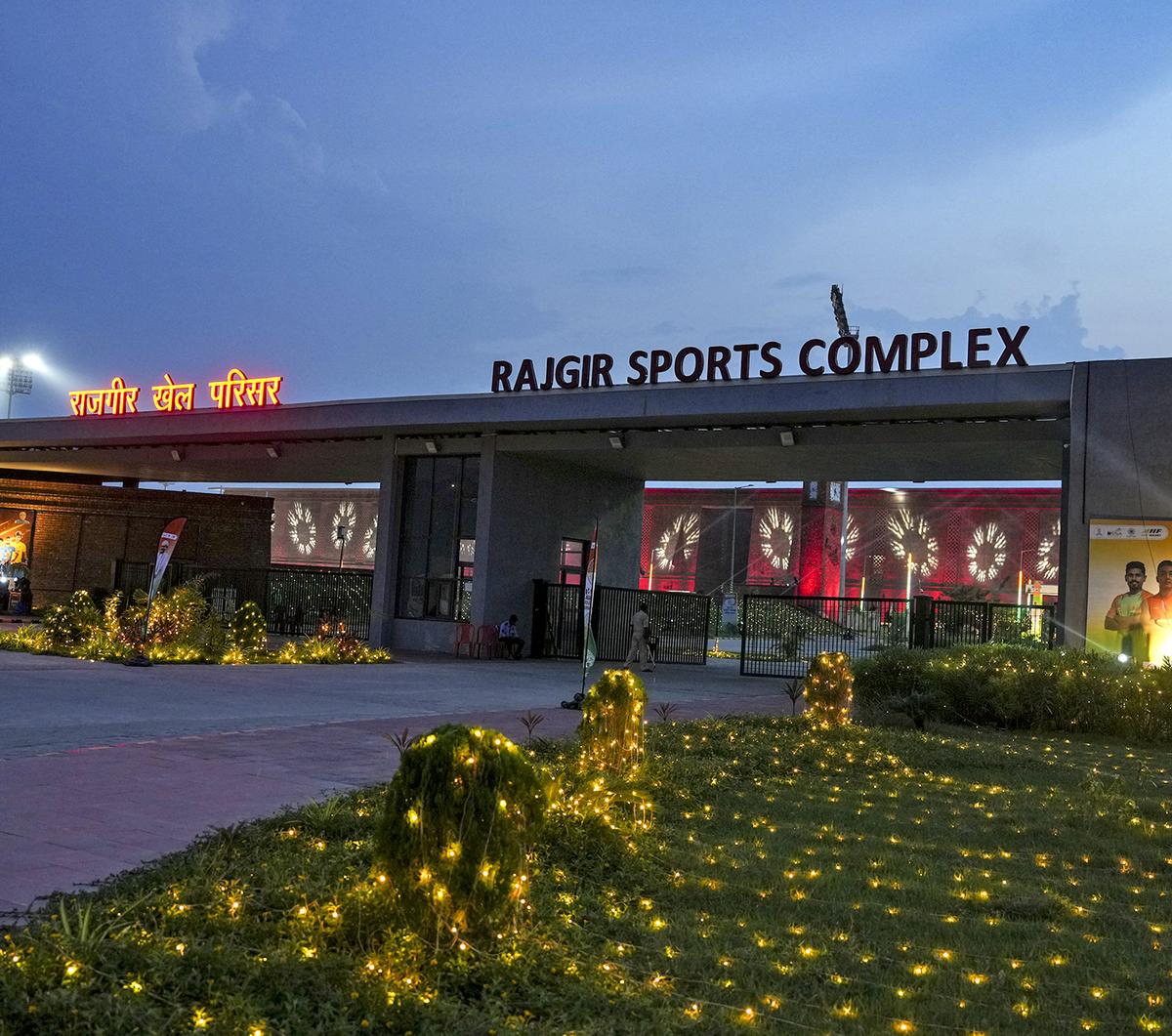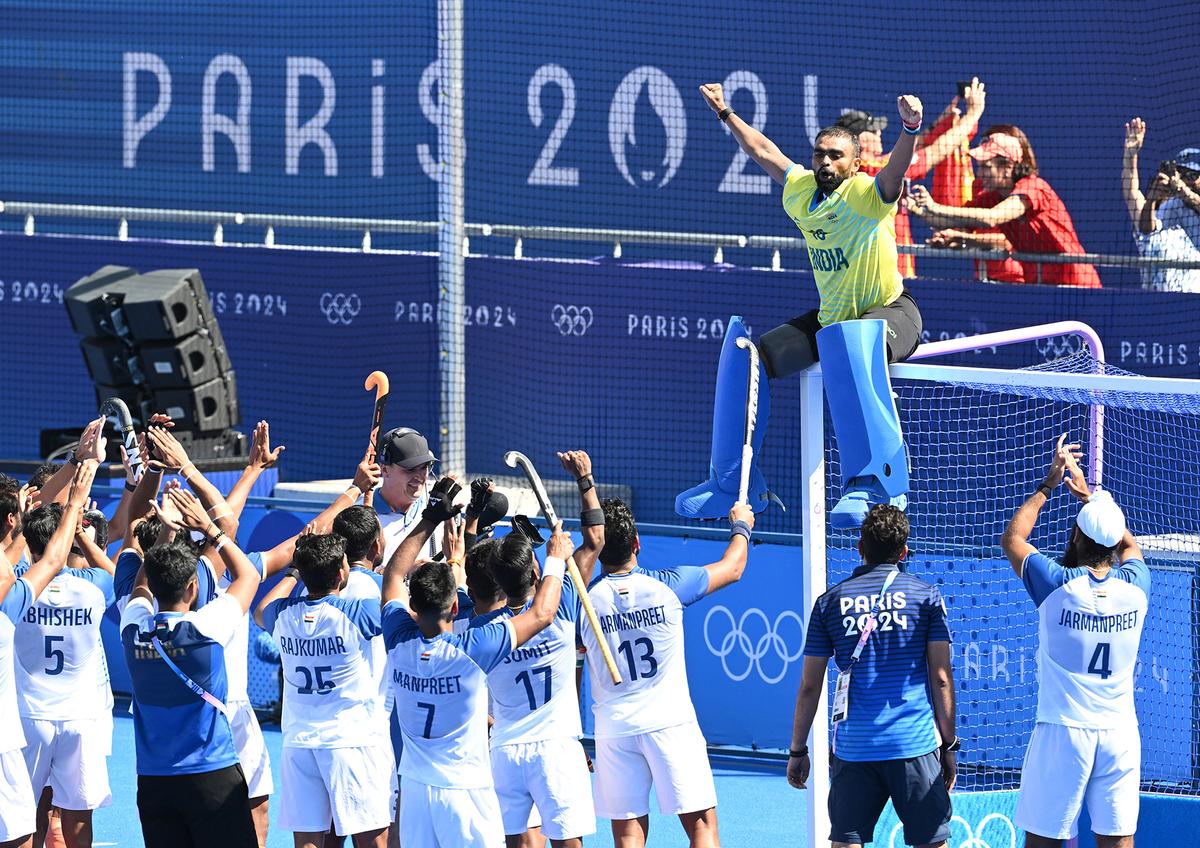India and Pakistan may have a tenuous relationship when it comes to sports but International Hockey Federation President Tayyab Ikram is convinced that sports is critical to finding a way out of conflicts.
“I think it is very important for the teams to play each other, it is important for every conflict in the world. Sport can unite. This is a decision taken by governments but you are playing now. I think it is important to play,” he told The Hindu in a freewheeling, wide-ranging interaction on the sidelines of the Asia Cup here.
The Rajgir Sports Complex stands out amidst lush green farmland in the backdrop of the Rajgir Hills and Tayyab is impressed not just with the venue but also the spreading of hockey to previously uncharted regions.

Illuminated premises of the Rajgir Sports Complex.
| Photo Credit:
PTI
“For me, in this tournament, we achieved not only a professional way of event organization but also bringing our events to places like Rajgir fulfils our responsibility and purpose of giving an opportunity to the community of Rajgir and Bihar. I think they have done very well.
“As part of our empowerment and engagement strategy, I brought two events to Poland, nobody thought the indoor World Cup could be played in Croatia. We had hockey 5s World Cup and Olympic qualifiers in Oman. We want to engage emerging nations, build trust for organising events and give the local community a chance to watch world class hockey. Same here. I only think that perhaps this stadium can be expanded just a little bit, not too much, where we can create an ambience. Today, what hockey needs is better presentation of our sport from the venue. A comfortable, close-in stadium can create a better deal.”
Rise of more Asian nations
As the only Asian team among the top 10 in world hockey for a while now, India’s superiority in the continent is a given but Tayyab believes others are putting in the effort to be competitive.
“I don’t think there is a huge gap. Malaysia also had good preparation, maybe they played even more games than India to prepare. They had European visits, they played Australia, New Zealand, they defeated Korea. They are 12th here. Their government is giving them good support.
“But yes, if you play more competitive games in a very professional event like the Pro League, it is different from having training tours. So in that sense yes, India has an edge. Being in the Pro League, it is obvious that they are among the top nine teams and playing the whole year. And when they come down to play other Asian countries, I think they have a better chance. And coming back from Paris with the bronze medal, the general expectation is that India is a better team.
“But now things are changing in China also. I was part of the discussions with their top authorities and my selling point was professionalism, especially in their coaching staff. They brought in some good, professional coaches for the women and now they brought in for men also. I tried my best for the government to be convinced because they work differently in China.
“Normally, our systematic growth model says that you develop, you grow, then you go for results. But the high performance system that China has had is result first, then you grow. I spent all my life there, they start with results and then they invest. And it is working. Frankly, today you need a few hundred hockey players in a high performance centre and you can have two good teams. Of course, you cannot ignore grassroots development and mass participation, you need to do that as well as a responsible federation,” he explained.

Indian players celebrate after winning the bronze at Paris 2024.
| Photo Credit:
File photo: RITU RAJ KONWAR
About Pakistan’s imminent return to top-tier hockey through the Pro League, Tayyab conceded that finances were a big part of development in modern sport but was optimistic that Pakistan would do better this time around. Incidentally, Pakistan was among the nations to be invited to the Pro League when it was first conceptualised, only to pull out citing monetary issues.
“I have been working closely with them, like I have with many other federations. I have been working long to make them realise how important the Pro League is and that they need to have a serious approach to it.
“But they need to manage the grants and finances. One important thing to acknowledge is that today, world hockey or any other sport, high performance is the key with a much stronger professional and financial model. If you don’t have strong financials, you are nowhere.
“Today, it’s a huge investment for high performance. Korea is still struggling with their finances, Japan is still struggling but they have governments supporting them, which helps. But I am sure that Pakistan, the way they qualified after the Nations Cup, is very determined to play at the World Cup.”
More sustainable HIL model
With questions being raised over the future of Hockey India League and doubts around foreign players’ participation, specially those from Europe, Tayyab was clear that while he had no official information about the same, he would understand that things could get difficult in a World Cup year.
“I have not received any official information on players being stopped by their federations. If anybody can give me a formal information received then we can see about it. I have had talks with many European federations and they have all been very positive and excited about the HIL. Yes, certain years can be challenging, like the World Cup. I am not sure of the numbers but I think only 12 of the 56 players retained for this year are not coming so it is not an embargo from anyone.
“I also met the franchises here, they asked me questions about the global calendar, told me about their concerns, which I was there to explain. For me, it is good that the private sector is coming into hockey. I am proud of what I did to give a window for this league. It is almost an embargo for world hockey for that time. I think that is far more important,” he said.
At the same time, while he refused to get into the financial details, he suggested that Hockey India broaden its horizons and figure out a more sustainable model for long-term success. “I think Hockey India also needs to re-look at a more sustainable model, which I think they are doing so that’s fine. They need to look at a broader base, look both up and down, not restrict themselves to very few countries. If somebody tells me that the best players in the world are only from the top 5-6 teams, then that’s not true.
“(Sadio) Mane comes from Senegal, (Mohd.) Salah is from Egypt. Good players are all over the world, you need to broaden your vision. If you restrict yourself to certain countries who are involved in a very similar calendar, then if something happens to the calendar, it will have a cascading effect.”
A big reason for 29 players – 21 men and eight women – pulling out of HIL last year was a perceptive lack of financial gains. It is a topic that has repeatedly been raised — ₹4 crore for men and ₹2 crore cap for women’s teams is considered way too low – but the onus lies on Hockey India and the franchises with FIH having no say in it. “Yes, money is important. I don’t know the details but anything that we can do to make it a more sustainable model needs to be considered,” he reiterated.
Tayyab is also clear that unlike football, the hockey World Cup will remain a 16 team event for the near future. “We’re not ready to expand, we’ll stick to 16 teams for at least the next 3-4 years. I am happy with 16”.
www.thehindu.com (Article Sourced Website)
#FIH #President #bats #engagement #resolve #conflicts
